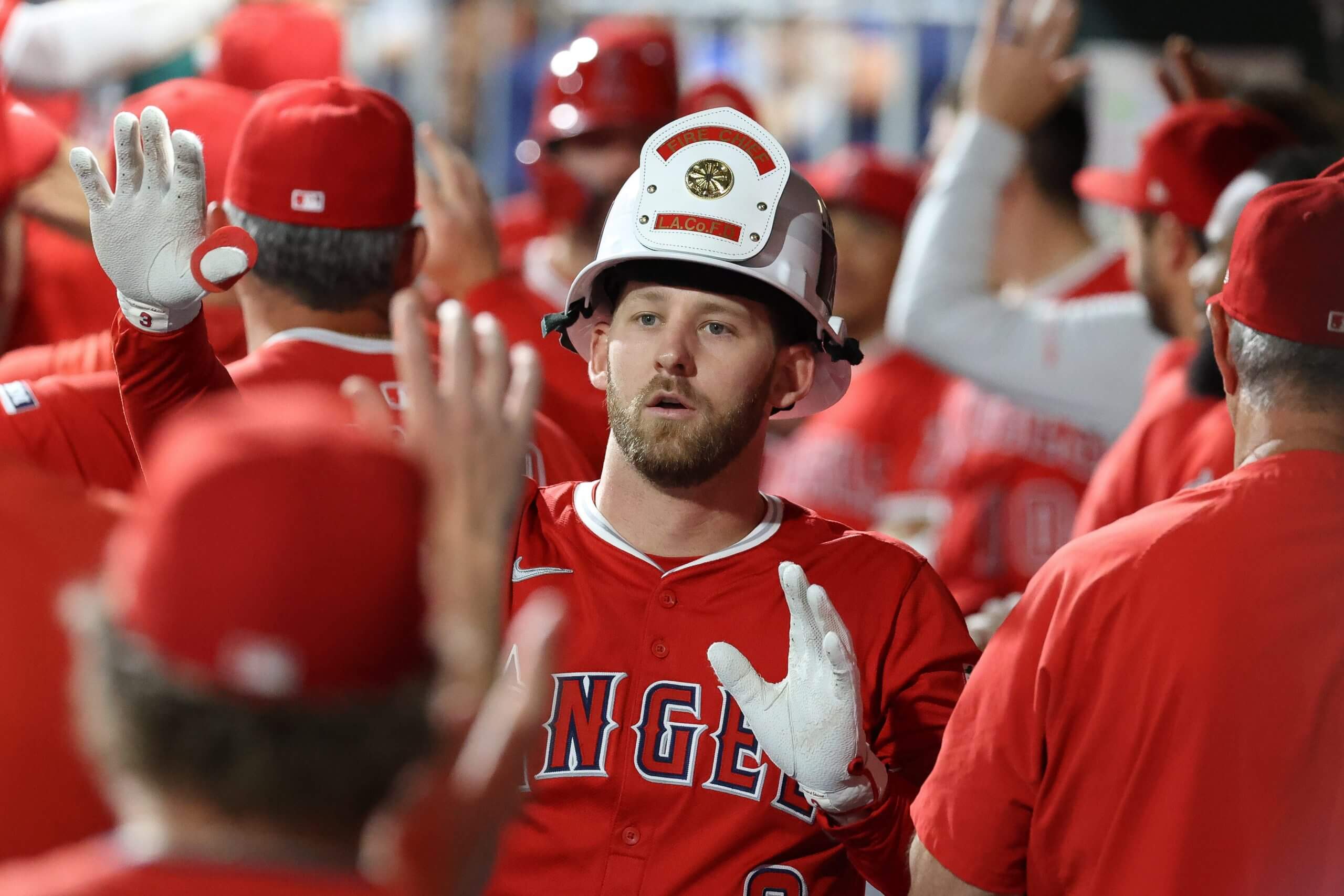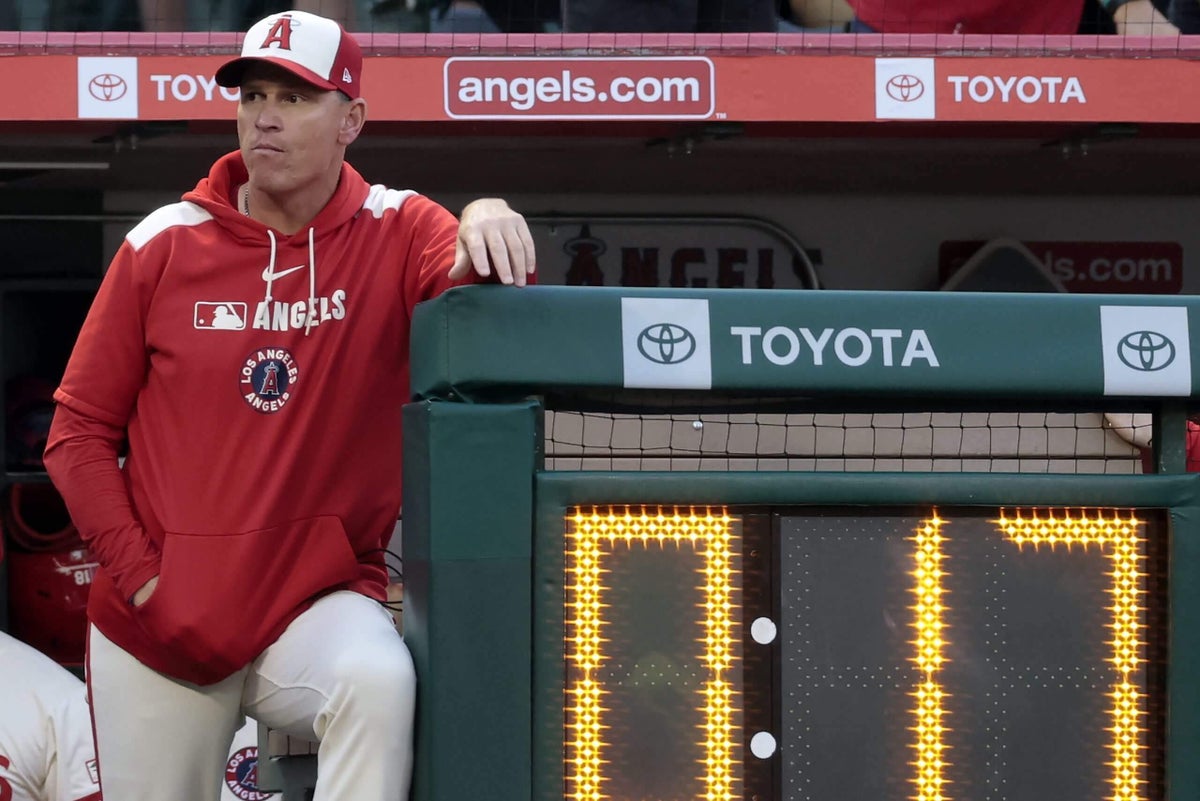NEW YORK — After the Angels were swept by the Mets on Wednesday afternoon, interim manager Ray Montgomery walked into the visitors clubhouse, where many players ambled around their lockers.
It wasn’t a formal team meeting; not everyone was present. Still, he wanted to deliver a message.
“I said to the guys, there wasn’t one ounce of quit,” Montgomery said. “The guys kept grinding through a tough game that could have gotten away from us, and it didn’t. We had chances. I was proud of the way we kept fighting.”
He’s right. The Angels have played inspired baseball, sometimes even in losses. It’s a team that is far more enjoyable to watch than the 99-loss disaster of last season. But when it comes to the tough choices this organization needs to consider over the next week, fight, heart and competence really shouldn’t matter that much.
The Angels, GM Perry Minasian and owner Arte Moreno need to face facts. They have a 2.8 percent chance to make the postseason this year, according to FanGraphs. They are 4 1/2 games out and have six teams ahead of them fighting for the final wild-card spot.
It’s not impossible. But anything other than preparing to sell wouldn’t be prudent. Minasian declined to discuss the deadline approach Monday at Citi Field, stating he’d talk next after the July 31 deadline passes. He hasn’t taken questions from reporters since the beginning of July.
There’s a lot of interest in Angels players, and competing teams around the league are very hopeful that they sell. It’s a huge opportunity for a team that has proven something very important this season: Acquiring good young players eventually leads to more wins.
This deadline presents an opportunity to lean into that even more, given they have leverage over competing teams desperate to improve. It’s an opportunity to put the franchise in a position to be legitimately competitive long-term. That might mean trading players with more than one year of team control. That includes Taylor Ward, Reid Detmers and José Soriano, among others, all of whom have been inquired about by competing clubs.

Trading a player like Taylor Ward would be tough. (Isaiah Vazquez / Getty Images)
Reasonable people could disagree on just how aggressive a sell-off the Angels want to conduct. But there’s no reasonable argument for anything other than selling, as things stand presently. Particularly as Moreno has been more frugal in his free-agent spending over the years, with Yusei Kikuchi’s 3-year, $63 million contract marking the most expensive deal since 2019.
Leveraging the deadline is a crucial element of building a competitive operation. But it’s unclear if Moreno understands that. And Minasian, whose contract expires after next season, might not be inclined to think far beyond 2026. It will ultimately come down to Moreno’s inclinations, as always. One team source suggested before the Mets series that he might not want to sell off, since it’s unfair to the fans.
That’s flawed logic — the kind they’ve employed over the last 11 dreadful seasons. What’s unfair to the fans is a malaise of perpetual failure. They’ve been different iterations of bad every year since 2015. Sure, they have a higher floor than the Rockies or White Sox. But with their modus operandi, their ceiling is also a lot lower.
Trading a player like Ward would be tough. And it would hurt their chances in 2026. But it might also bring back talented players who could be the backbone of their competitive window. That’s how good teams build, and rebuild quickly — by establishing a pipeline of talent that has not existed in Anaheim in a long time.
Winning often requires tough choices and sacrifice. That’s the mindset the Angels need to employ, but almost certainly won’t. They have always operated in the interest of cobbling together a good enough team, not building something self-sustaining. That’s why trading players with years of team control is often off-limits this time of year.
The Angels’ run differential this season is minus-65. They are 19-12 in one-run games. And they have remained extremely healthy, thus far, throughout the season. They went the entire first half of the season using the same five starting pitchers.
Players, coaches and fans want to, and should, look for the positives in evaluating where the Angels are. Hope and optimism can help a club. But front offices need to be cold calculators in assessing the operations. They need to ask if what they’ve built is actually good enough to be one of the best teams after 162 games.
The Angels were not overmatched by the Mets. But the sweep highlighted areas of weakness.
Poor defensive decision-making was on display. The bullpen wasn’t able to lock down leads. And the offense missed several big scoring chances.
“It’s frustrating,” Angels catcher Logan O’Hoppe said after his team blew a four-run lead in a loss Monday. “We’ve got to win games in the second half. We’re over good looks, we’re over good signs. We’ve got to win games.”
This is what you want your starting catcher to say. This is exactly the right mindset, and whether the Angels sell, the players need to keep that way of thinking.
But there needs to be a distinction between what the players’ goals are in the clubhouse and the prudent decisions of a big-league front office. Maybe they’ll go 7-0 this week, and change the entire calculation. If that happens, great, you can reset.
The whole point, however, is that this team’s decision-makers need to be preparing for what’s most likely, instead of praying for a miracle.
(Top photo of Ray Montgomery: Ronald Martinez / Getty Images)
